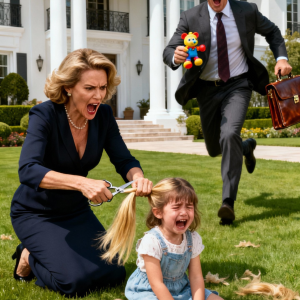
I got married at twenty-five, believing it was the fairy-tale ending every woman longed for. But only three years later, I realized it was the worst mistake I’d ever made.
That day, my body was burning with a fever that soared over 40°C. I was shivering uncontrollably, my head spinning, every part of me aching.
All I wanted was to lie still and rest. But when evening came and my husband, Daniel, walked in from work, his first words were filled with anger:
“Why isn’t dinner ready? What have you been doing all day?”
I tried to sit up, my voice barely a whisper. “Daniel… I’ve got a fever. I really can’t manage it tonight. I promise I’ll cook tomorrow.”
His face twisted with rage. “A woman who can’t even cook dinner is useless!” he yelled, and then his hand came crashing across my face.
My cheek burned, tears streamed down my face—I couldn’t tell if it was from pain or humiliation. I managed to murmur, “Daniel, please… I’m really sick…”
But he ignored me completely, storming into the bedroom and slamming the door, leaving me trembling on the couch.
That night, as my fever raged and my mind drifted in and out, I saw the truth clearly for the first time: the man I had called my husband had never loved me. To him, I was nothing more than a servant.
By morning, the decision was made. My hands shook, but my heart was calm as I filled out the divorce papers and signed my name.

When he came out of the bedroom, I met his eyes and said firmly: “Daniel, I want a divorce. I’m done living like this.”
Before he could speak, his mother, Mrs. Ellis, rushed out of the kitchen, her voice rising like a storm: “Divorce? Don’t be ridiculous! You think you can just walk out of this house?”
She jabbed her finger at me, shouting louder: “If you leave, you’ll end up with nothing! Who would ever want a worthless woman like you?”
Her words struck hard, but for once, they didn’t wound me. I stood tall, looked her in the eye, and replied calmly:
“Living on the streets would still be better than staying here without dignity. At least beggars are free. I’d rather beg than live as your family’s shadow.”
The room went silent. Even Daniel, who had come out to yell, stopped in his tracks. For the first time, I wasn’t afraid of them.
With a small suitcase in hand, I walked out. Neighbors watched from their doors, whispering, “Poor woman—but she’s brave.”
Life after leaving wasn’t easy. I rented a tiny apartment, went back to work, and started over. But every morning, I woke up feeling lighter. There were no more slaps, no more fear, no more walking on eggshells.
A month later, I began to find my rhythm again. My health returned, my job improved, and I met people who truly cared.
That’s when I learned that happiness doesn’t come from luxury—it comes from peace, self-respect, and freedom.
Meanwhile, Daniel and his mother got what they deserved. Word spread about his temper and her cruelty, and soon, their family shop lost all its customers. People avoided them, tired of their arrogance.
As time passed, I grew stronger and more confident. Sometimes I think back to that night of fever—it was the moment that changed everything.
Someone once asked if I regretted the divorce. I smiled and said:
“Regret? Not at all. My only regret is not leaving sooner. If I hadn’t signed those papers that day, I’d still be living in the dark. Now I’m free—and freedom is the greatest happiness of all.”




